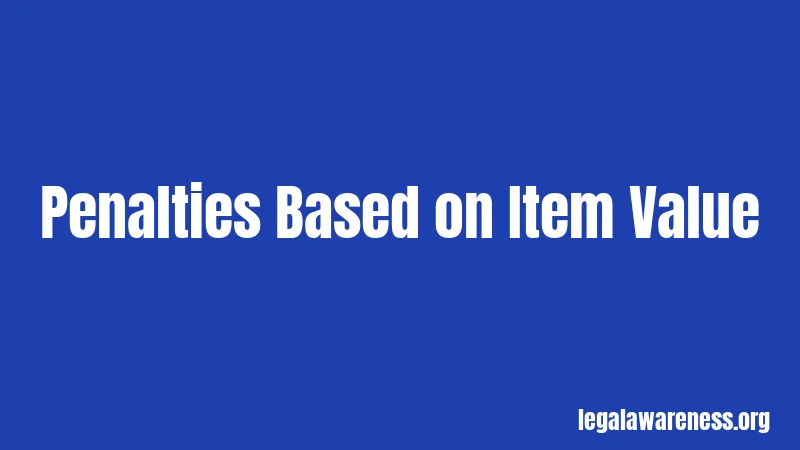Florida Shoplifting Laws (2026): Your Complete Legal Guide
Most people think shoplifting is just a minor offense. But in Florida, that assumption could get you in serious trouble. The state has strict retail theft laws, and the consequences can be way worse than you might expect.
Here’s what you need to know: Florida treats shoplifting as a crime. Depending on what you took and how much it was worth, you could face jail time, hefty fines, and a permanent criminal record. Let’s break down exactly what counts as shoplifting in Florida and what happens if you get caught.
What Is Shoplifting in Florida?

Shoplifting is when you take merchandise from a store without paying for it. That sounds simple, but Florida’s law is actually broader than you might think.
In Florida, shoplifting (called “retail theft” in the law) covers more than just sneaking items out. It also includes switching price tags to pay less, leaving a store with items you didn’t pay for, and even helping someone else shoplift. Yep, that’s all illegal.
Here’s the thing: you don’t have to successfully leave the store with merchandise for it to be a crime. Even trying counts. If you’re caught putting items in a bag with the intention to steal them, that’s enough for an arrest.
Basic Florida Shoplifting Laws
What Exactly Counts as Retail Theft
Florida defines retail theft in multiple ways. Taking merchandise without paying is the obvious one. But so is intentionally concealing unpaid merchandise while still in the store.
Altering price tags to pay less counts too. So does removing or tampering with security devices. Even using a coupon you know is fake or expired is considered retail theft in some cases.
You can also be charged if you help someone else shoplift. That’s called retail theft by assistance. The law doesn’t care if you personally took the item. If you helped make it happen, you’re guilty.
Wondering where the line is? If there’s intent to deprive the store owner of merchandise or payment, Florida considers it theft. It’s that straightforward.
Prosecution and Store Liability
Here’s where it gets interesting. Store employees and managers can legally detain you if they have reasonable suspicion you’ve shoplifted. This detention can only last as long as needed to investigate and call law enforcement.
But stores have to be careful. If they falsely accuse you or hold you longer than necessary, they could face a lawsuit. Florida law actually protects shoppers from false imprisonment.
The store doesn’t have to catch you in the act either. If security footage shows you concealing merchandise, that’s evidence. If you abandon items in the store after being confronted, that can also be used against you.
Penalties Based on Item Value

Misdemeanor Shoplifting
Okay, this is important. In Florida, the penalties depend on the value of what was taken.
If the merchandise is worth less than $100, you face a second-degree misdemeanor. That means up to 60 days in jail and a fine up to $500. Sounds manageable, right? Wrong. A criminal record lasts forever.
If the value is between $100 and $300, it’s still a second-degree misdemeanor, but the consequences might be more serious at sentencing. Judges have discretion here.
If the merchandise is worth $300 to $750, you’re looking at a third-degree felony. This carries up to 5 years in prison and fines up to $5,000.
If it’s $750 to $5,000, that’s also a third-degree felony, same prison time and fine range.
Felony Shoplifting
Here’s where things get really serious.
If the merchandise is worth $5,000 or more, you face a second-degree felony. That means up to 15 years in prison and up to $10,000 in fines.
If it’s a repeated offense in your history, the charges can be upgraded. A second shoplifting conviction within 5 years can bump you up a felony level.
Even first-time felony theft can result in mandatory fines. And unlike some misdemeanors, felony records don’t disappear easily.
Additional Consequences Beyond Fines and Jail
Stop and read this carefully. A shoplifting conviction can affect your future in ways you might not realize.
You could lose your job. Many employers run background checks and won’t hire people with theft convictions. That’s legal in Florida.
You might not get certain professional licenses. Teaching, nursing, real estate, and many other fields require background checks. A theft conviction could disqualify you.
Housing gets harder too. Many landlords refuse to rent to people with theft records. Student loans and financial aid can be affected if you have a felony.
And here’s the big one: a felony conviction means you lose voting rights in Florida until you’ve completed your sentence, including probation. That’s permanent for some offenses.
Recent Changes to Florida’s Shoplifting Laws
2023 Legislative Updates
Florida made some changes recently to how shoplifting is handled. These updates focused on repeat offenders and organized retail crime.
In 2023, Florida strengthened penalties for organized retail theft rings. If you’re part of a group that steals merchandise to resell it, you face enhanced charges. The law now specifically targets coordinated theft operations.
The state also increased penalties for second and subsequent offenses. If you’ve been convicted of retail theft before, the next conviction carries harsher consequences.
How Stores Are Using Technology
Retailers in Florida now use sophisticated surveillance systems. Many stores have facial recognition technology that flags shoplifters.
Some stores share databases of suspected shoplifters. If you’re caught in one store, other retailers might already know about it. Loss prevention specialists now work across multiple locations.
This technology is getting better every year. What you might have gotten away with five years ago is being caught now.
How Stores Get Permission to Detain You

The Shopkeeper’s Privilege
Florida law gives store employees and security staff what’s called “shopkeeper’s privilege.” This is legal protection that allows them to stop you and investigate suspected theft.
But here’s the important part: they need reasonable suspicion. That means they can’t just assume you’re stealing because of how you look or dress.
Reasonable suspicion comes from actual evidence. Maybe you placed items directly into your bag without scanning them. Maybe security footage shows you concealing merchandise. Those are grounds for detention.
The detention has to be reasonable too. They can’t keep you for hours. It needs to be brief and only last as long as needed to investigate. Once they’ve made a reasonable determination, they have to let you go or call police.
If they exceed this privilege, you could sue for false imprisonment. And honestly, that’s protected consumer behavior. Don’t let anyone scare you into thinking retailers have unlimited power.
Special Circumstances and Exceptions
Accidental Shoplifting
Okay, here’s something that surprises people. Florida law doesn’t have a “mistake” exception for shoplifting.
If you genuinely forgot to pay for something, that’s still technically theft. You might argue it’s unintentional, but the law doesn’t automatically excuse accidental shoplifting.
That said, prosecutors have discretion. If you can prove the item was truly an accident and you offered to pay immediately, a prosecutor might drop charges. But you’d need evidence of your good faith.
If you realize you didn’t pay, go back immediately and pay. Tell a manager what happened. Document your actions. This shows good faith if you’re ever questioned.
Minors and Shoplifting
Florida treats minors differently than adults for some offenses, but shoplifting isn’t always one of them.
If you’re under 14 and accused of retail theft, the case typically goes to juvenile court. The consequences are different and less severe than adult court.
But if you’re 14 or 15, you can be charged as an adult depending on the circumstances. The amount stolen and your criminal history matter.
If you’re 16 or older, you’re usually tried as an adult for shoplifting charges.
A juvenile shoplifting conviction can still follow you. It might be sealed eventually, but it affects school enrollment, job prospects while you’re young, and other opportunities.
Shoplifting with Disabilities
Some disabilities might affect your ability to understand the law or control your actions. Florida courts sometimes consider mental health factors at sentencing.
This doesn’t mean you get a free pass. But if you have a documented disability that impacts your behavior, your defense attorney can present that to the judge.
Compulsive behaviors related to conditions like kleptomania can sometimes result in treatment options instead of pure punishment. But you need professional documentation and legal representation.
Bail and Release After Arrest
What Happens After You’re Arrested
If you’re arrested for shoplifting, police will take you to the station and book you. They’ll read you your rights and take information.
For misdemeanor shoplifting (under $300), you might get released on your own recognizance. That means you sign a paper promising to show up for court, and you walk free.
For felony theft, you’ll likely face a bail hearing. A judge will decide if you can be released and how much bail you need to post.
Bail amounts vary based on your criminal history, ties to the community, and the specific charges. First-time offenders often get lower bail than repeat offenders.
Understanding Your Rights
Here’s a critical point: you have the right to remain silent. Don’t talk to police without a lawyer present.
You also have the right to a lawyer. If you can’t afford one, the state provides a public defender.
Don’t give police permission to search you, your car, or your home without a warrant. Don’t sign anything without reading it first. Don’t make excuses or explanations without your attorney there.
These rights exist for a reason. Use them.
How to Respond If You’re Accused of Shoplifting
Immediate Actions
If a store employee stops you and accuses you of shoplifting, stay calm. Don’t run. Don’t become aggressive. Don’t try to convince the employee you didn’t do it.
Politely say, “I’d like to speak to a lawyer before answering questions.” That’s it. Say nothing else.
If they call police, repeat that request to officers. Don’t consent to searches. Don’t explain what you were doing.
Calmly provide your identification if asked, but beyond that, stay silent until you have legal representation.
Building Your Defense
Once you have a lawyer, they’ll investigate. They might request security footage. They might interview witnesses. They might challenge whether police had legal grounds to stop you.
Document everything you remember. Write down the date, time, location, and what happened. Note the names and descriptions of any witnesses. Keep receipts for anything you purchased that day.
Don’t post about it on social media. What you say online can be used against you. Seriously.
Don’t go back to that store (unless your lawyer advises it). Stay out of trouble while your case is pending. A subsequent arrest makes your situation worse.
Working with a Criminal Defense Attorney
Get a criminal defense attorney immediately. Don’t wait. Public defenders are trained and capable, but they’re often overworked.
If you can afford a private attorney, it might help. They can spend more time on your case and negotiate more aggressively.
Your attorney will review the evidence, identify legal weaknesses in the case against you, and negotiate with prosecutors. Sometimes a good attorney gets charges reduced or dismissed.
If it goes to trial, your attorney will present your defense to a judge or jury.
Frequently Asked Questions
Can a store refuse to refund my money after a shoplifting accusation? Yes. If police become involved and confiscate merchandise, it becomes evidence. You can’t just get your money back. Once a legal case starts, the merchandise stays with police until the case concludes.
Will a shoplifting charge show up on background checks? If you’re convicted, yes. Misdemeanors and felonies both appear on criminal background checks. Only sealed or expunged records are hidden. A good attorney might help get your record sealed after enough time passes.
Can I get my shoplifting record expunged in Florida? After 2020, Florida made expungement easier in some cases. For misdemeanor shoplifting, you might be eligible after 2 years if you weren’t convicted. For felony theft, it’s more complicated. Talk to an attorney about your specific situation.
What if the store doesn’t have security footage? Without clear evidence, the case becomes harder to prove. It might be your word against the store’s. That’s when witness accounts and other details matter. Your attorney can use this to challenge the case.
If I shoplift something worth $1, am I committing the same crime as if I steal something worth $100? Both are retail theft, but the penalties differ dramatically. $1 worth of merchandise doesn’t result in jail time. $100 worth does. Value matters significantly for determining consequences.
Final Thoughts
Shoplifting in Florida is serious business. The laws are strict, the penalties are real, and the consequences follow you long after any jail time ends.
Now you know the basics. The charges depend on what was taken. Felony convictions mean prison time. Criminal records affect your future in every way imaginable.
If you’re facing shoplifting charges, don’t delay getting legal help. A good attorney can make a real difference.
If you’re thinking about shoplifting, don’t. It’s not worth the risk. The punishment doesn’t fit the momentary gain, and the impact on your future is permanent.
Stay informed, stay smart, and when in doubt about the law, ask a lawyer.
